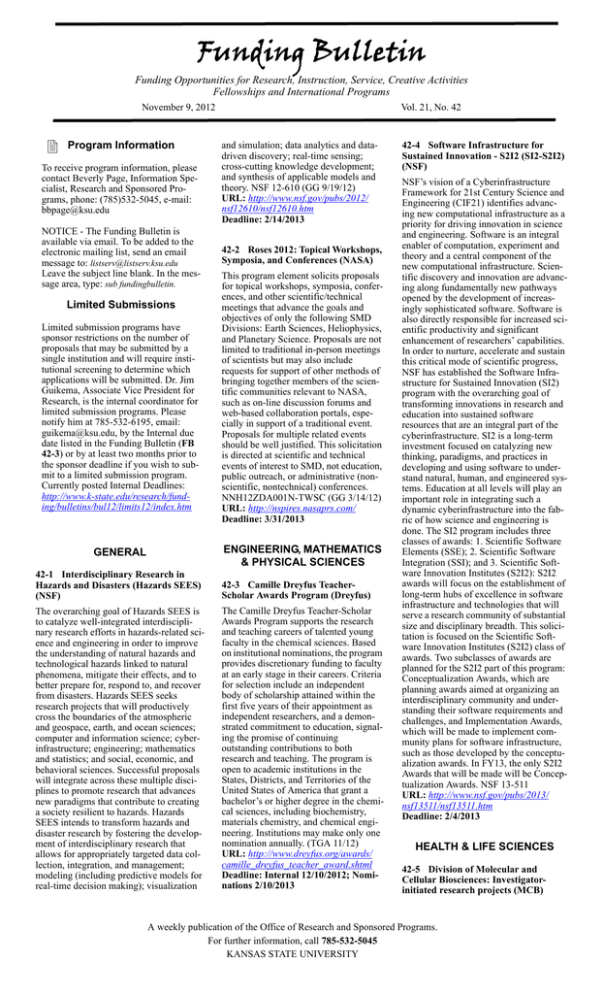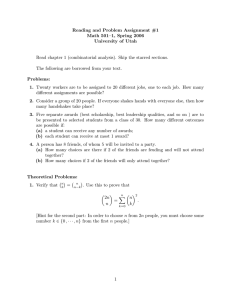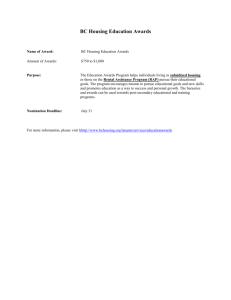Funding Bulletin
advertisement

Funding Bulletin Funding Opportunities for Research, Instruction, Service, Creative Activities Fellowships and International Programs November 9, 2012 Program Information To receive program information, please contact Beverly Page, Information Specialist, Research and Sponsored Programs, phone: (785)532-5045, e-mail: bbpage@ksu.edu NOTICE - The Funding Bulletin is available via email. To be added to the electronic mailing list, send an email message to: listserv@listserv.ksu.edu Leave the subject line blank. In the message area, type: sub fundingbulletin. Limited Submissions Limited submission programs have sponsor restrictions on the number of proposals that may be submitted by a single institution and will require institutional screening to determine which applications will be submitted. Dr. Jim Guikema, Associate Vice President for Research, is the internal coordinator for limited submission programs. Please notify him at 785-532-6195, email: guikema@ksu.edu, by the Internal due date listed in the Funding Bulletin (FB 42-3) or by at least two months prior to the sponsor deadline if you wish to submit to a limited submission program. Currently posted Internal Deadlines: http://www.k-state.edu/research/funding/bulletins/bul12/limits12/index.htm Vol. 21, No. 42 and simulation; data analytics and datadriven discovery; real-time sensing; cross-cutting knowledge development; and synthesis of applicable models and theory. NSF 12-610 (GG 9/19/12) URL: http://www.nsf.gov/pubs/2012/ nsf12610/nsf12610.htm Deadline: 2/14/2013 42-2 Roses 2012: Topical Workshops, Symposia, and Conferences (NASA) This program element solicits proposals for topical workshops, symposia, conferences, and other scientific/technical meetings that advance the goals and objectives of only the following SMD Divisions: Earth Sciences, Heliophysics, and Planetary Science. Proposals are not limited to traditional in-person meetings of scientists but may also include requests for support of other methods of bringing together members of the scientific communities relevant to NASA, such as on-line discussion forums and web-based collaboration portals, especially in support of a traditional event. Proposals for multiple related events should be well justified. This solicitation is directed at scientific and technical events of interest to SMD, not education, public outreach, or administrative (nonscientific, nontechnical) conferences. NNH12ZDA001N-TWSC (GG 3/14/12) URL: http://nspires.nasaprs.com/ Deadline: 3/31/2013 ENGINEERING, MATHEMATICS & PHYSICAL SCIENCES GENERAL 42-1 Interdisciplinary Research in Hazards and Disasters (Hazards SEES) (NSF) 42-3 Camille Dreyfus TeacherScholar Awards Program (Dreyfus) The overarching goal of Hazards SEES is to catalyze well-integrated interdisciplinary research efforts in hazards-related science and engineering in order to improve the understanding of natural hazards and technological hazards linked to natural phenomena, mitigate their effects, and to better prepare for, respond to, and recover from disasters. Hazards SEES seeks research projects that will productively cross the boundaries of the atmospheric and geospace, earth, and ocean sciences; computer and information science; cyberinfrastructure; engineering; mathematics and statistics; and social, economic, and behavioral sciences. Successful proposals will integrate across these multiple disciplines to promote research that advances new paradigms that contribute to creating a society resilient to hazards. Hazards SEES intends to transform hazards and disaster research by fostering the development of interdisciplinary research that allows for appropriately targeted data collection, integration, and management; modeling (including predictive models for real-time decision making); visualization The Camille Dreyfus Teacher-Scholar Awards Program supports the research and teaching careers of talented young faculty in the chemical sciences. Based on institutional nominations, the program provides discretionary funding to faculty at an early stage in their careers. Criteria for selection include an independent body of scholarship attained within the first five years of their appointment as independent researchers, and a demonstrated commitment to education, signaling the promise of continuing outstanding contributions to both research and teaching. The program is open to academic institutions in the States, Districts, and Territories of the United States of America that grant a bachelor’s or higher degree in the chemical sciences, including biochemistry, materials chemistry, and chemical engineering. Institutions may make only one nomination annually. (TGA 11/12) URL: http://www.dreyfus.org/awards/ camille_dreyfus_teacher_award.shtml Deadline: Internal 12/10/2012; Nominations 2/10/2013 42-4 Software Infrastructure for Sustained Innovation - S2I2 (SI2-S2I2) (NSF) NSF’s vision of a Cyberinfrastructure Framework for 21st Century Science and Engineering (CIF21) identifies advancing new computational infrastructure as a priority for driving innovation in science and engineering. Software is an integral enabler of computation, experiment and theory and a central component of the new computational infrastructure. Scientific discovery and innovation are advancing along fundamentally new pathways opened by the development of increasingly sophisticated software. Software is also directly responsible for increased scientific productivity and significant enhancement of researchers’ capabilities. In order to nurture, accelerate and sustain this critical mode of scientific progress, NSF has established the Software Infrastructure for Sustained Innovation (SI2) program with the overarching goal of transforming innovations in research and education into sustained software resources that are an integral part of the cyberinfrastructure. SI2 is a long-term investment focused on catalyzing new thinking, paradigms, and practices in developing and using software to understand natural, human, and engineered systems. Education at all levels will play an important role in integrating such a dynamic cyberinfrastructure into the fabric of how science and engineering is done. The SI2 program includes three classes of awards: 1. Scientific Software Elements (SSE); 2. Scientific Software Integration (SSI); and 3. Scientific Software Innovation Institutes (S2I2): S2I2 awards will focus on the establishment of long-term hubs of excellence in software infrastructure and technologies that will serve a research community of substantial size and disciplinary breadth. This solicitation is focused on the Scientific Software Innovation Institutes (S2I2) class of awards. Two subclasses of awards are planned for the S2I2 part of this program: Conceptualization Awards, which are planning awards aimed at organizing an interdisciplinary community and understanding their software requirements and challenges, and Implementation Awards, which will be made to implement community plans for software infrastructure, such as those developed by the conceptualization awards. In FY13, the only S2I2 Awards that will be made will be Conceptualization Awards. NSF 13-511 URL: http://www.nsf.gov/pubs/2013/ nsf13511/nsf13511.htm Deadline: 2/4/2013 HEALTH & LIFE SCIENCES 42-5 Division of Molecular and Cellular Biosciences: Investigatorinitiated research projects (MCB) A weekly publication of the Office of Research and Sponsored Programs. For further information, call 785-532-5045 KANSAS STATE UNIVERSITY (NSF) The Division of Molecular and Cellular Biosciences (MCB) supports quantitative, predictive, and theory-driven fundamental research and related activities designed to promote understanding of complex living systems at the molecular, subcellular, and cellular levels. MCB is soliciting proposals for hypothesis-driven and discovery research and related activities in four core clusters: Molecular Biophysics; Cellular Dynamics and Function; Genetic Mechanisms; and Systems and Synthetic Biology. MCB gives high priority to research projects that use theory, methods, and technologies from physical sciences, mathematics, computational sciences, and engineering to address major biological questions. Research supported by MCB uses a range of experimental approaches—including in vivo, in vitro and in silico strategies—and a broad spectrum of model and non-model organisms, especially microbes and plants. NSF 13-510 URL: http://www.nsf.gov/pubs/2013/ nsf13510/nsf13510.htm Deadline: 1/30/2013, 11/15/2013 INTERNATIONAL/MULTICULTURAL 42-6 Short-Term Travel Grants (IREX) The Short-Term Travel Grants Program (STG) supports postdoctoral scholars and professionals to conduct independent or collaborative research in Eastern Europe and Eurasia. With its flexible format and quick turnaround time, this program meets an important need for the scholarly and policy communities, and makes a direct impact on the formation of U.S. foreign policy through the support of policy-relevant, open-source research on current regional issues of importance to the United States. Eligible Countries of Research are: Albania, Armenia, Azerbaijan, Belarus, Bosnia and Herzegovina, Bulgaria, Croatia, Czech Republic, Estonia, Georgia, Hungary, Kazakhstan, Kosovo, Kyrgyzstan, Latvia, Lithuania, Macedonia, Moldova, Montenegro, Poland, Romania, Russia, Serbia, Slovakia, Slovenia, Tajikistan, Turkmenistan, Ukraine, and Uzbekistan. (TGA 11/12) URL: http://www.irex.org/application/ short-term-travel-grants-stg-application Deadline: 2/6/2013 SOCIAL SCIENCES 42-7 Autism Research (Simons) The mission of the Simons Foundation Autism Research Initiative is to improve the diagnosis and treatment of autism spectrum disorders by funding, catalyzing, and driving research of the greatest quality. The program is seeking applications for SFARI awards from individuals who will conduct bold, imaginative, rigorous, and relevant research. Applications are invited for the following types of awards: SFARI Pilot Awards are intended for innovative, high-impact pro- posals requesting support for small-scale projects or early-stage experiments that will build on preliminary data or a prior track record and lead to competitive applications for funding by SFARI or other organizations. Investigators new to the field of autism are encouraged to apply for pilot awards. SFARI Research Awards are designed for investigators with demonstrated expertise conducting compelling high-impact research on an experimental hypothesis for which, in most cases, preliminary data have already been gathered. The foundation also will consider projects focused on a central hypothesis where success depends on close collaboration between two or more labs. (PND 11/9/12) URL: http://sfari.org/funding/grants/ 2013-rfa Deadline: 11/30/2012 toral students to earn up to four years of financial support along with outstanding benefits and opportunities while pursuing degrees in fields of study that utilize high performance computing technology to solve complex problems in science and engineering. The DOE CSGF is open to U.S. citizens or permanent resident aliens who are planning full-time, uninterrupted study toward a Ph. D. at an accredited U.S. university. Senior undergraduate and first-year doctoral students (at the time of application) in engineering and in the physical, computer, mathematical or life sciences are eligible to apply. URL: https://www.krellinst.org/doecsgf/ application/ Deadline: 1/8/2013 42-8 Ethical Issues in Research on HIV/AIDS and its Co-morbidities (R01) (NIH) This Funding Opportunity Announcement (FOA) invites applications addressing ethical issues in research relevant to populations with HIV and associated co-morbidities, and populations at high risk of HIV acquisition. The bioethics projects supported through this program announcement will focus on at least one of the following three goals: 1) Development of the empirical knowledge base for human subjects protection and ethics standards in HIV/AIDS research; 2) Development of conceptual bioethics approaches to advance scholarship on difficult ethical challenges in HIV/AIDS research; 3) Supporting the integration of bioethics work with ongoing research in HIV/AIDS. PAR-12-244 (NIHG 7/27/12) URL: http://grants.nih.gov/grants/guide/ pa-files/PAR-12-244.html Deadline: 1/7/2013, 1/7/2014, 1/7/2015 STUDENTS 42-9 Earth and Space Science Fellowship (NESSF) Program (NASA) NASA announces a call for graduate fellowship proposals to the NASA Earth and Space Science Fellowship (NESSF) program for the 2013-2014 academic year. This call for fellowship proposals solicits applications from accredited U.S. universities on behalf of individuals pursuing Master of Science (M. Sc.) or Doctoral (Ph.D.) degrees in Earth and space sciences, or related disciplines. The purpose of NESSF is to ensure continued training of a highly qualified workforce in disciplines needed to achieve NASA’s scientific goals. Awards resulting from the competitive selection will be made in the form of training grants to the respective universities. NESSF13 URL: http://nspires.nasaprs.com/ Deadline: 2/1/2013 42-10 Computational Science Graduate Fellowship (DOE) This is an exciting opportunity for doc- R.W. Trewyn, Vice President for Research Jim Guikema, Associate Vice President for Research Caron Boyce, Administrative Specialist Preaward Section Paul Lowe, Director Anita Fahrny, Assistant Director Kathy Tilley, Rich Doan, Carmen Garcia, Adassa Roe, Diana McElwain, Katie Small, Rex Goff, Namrita Berry, Cecilia Scaler, Sharon Zoeller Funding Information Specialist & Editor Beverly Page Development Director Mary Lou Marino Human Subjects, Animal Care & Use, and Biosafety Gerald P. Jaax, Associate Vice President, Research Compliance Heath Ritter, Compliance Monitor Adrian Self, Administrative Specialist Congressional Relations Sue Peterson, R.W. Trewyn A weekly publication of the Office of Research and Sponsored Programs. For further information, call 785-532-5045 KANSAS STATE UNIVERSITY

